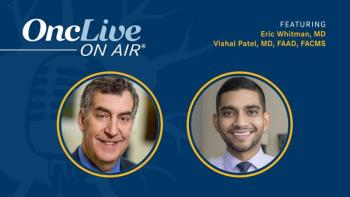
FDA Approval Insights: Relatlimab Plus Nivolumab in Melanoma
Dr Lipson discusses the significance of the regulatory decision for relatlimab and nivolumab, updated data from the RELATIVITY-047 trial, adverse effects clinicians associated with the doublet, and the potential next steps for this therapy in melanoma.
Welcome to OncLive On Air®! I’m your host today, Caroline Seymour.
OncLive On Air® is a podcast from OncLive®, which provides oncology professionals with the resources and information they need to provide the best patient care. In both digital and print formats, OncLive® covers every angle of oncology practice, from new technology to treatment advances to important regulatory decisions.
In today’s episode, we had the pleasure of speaking with Evan J. Lipson, MD, associate professor of oncology at Johns Hopkins University, to discuss the FDA approval of relatlimab plus nivolumab (Opdualag) in melanoma.
On March 18, 2022, the FDA approved the fixed-dose combination of relatlimab plus nivolumab for the treatment of adult and pediatric patients at least 12 years of age with unresectable or metastatic melanoma.
The regulatory decision was based on findings from the phase 2/3 RELATIVITY-047 trial (NCT03470922), in which the combination regimen led to a median progression-free survival (PFS) of 10.1 months (95% CI, 6.4-15.7) vs 4.6 months (95% CI, 3.4-5.6) with single-agent nivolumab (n = 359; HR, 0.75; 95% CI, 0.62-0.92; P = .0055).
In RELATIVITY-047, 714 patients were randomized 1:1 to receive the fixed-dose combination of relatlimab at 160 mg and nivolumab at 480 mg administered every 4 weeks, or single-agent nivolumab at 480 mg administered every 4 weeks.
Additional data from this trial showed higher PFS rates in the doublet arm vs the monotherapy arm. At 12 months, the PFS rate for the doublet arm was 48.0% (95% CI, 42.5%-53.4%) compared with 36.9% (95% CI, 31.7%-42.1%) in the monotherapy arm. At 24 months, the PFS rate for the doublet arm was 38.5% (95% CI, 32.7%-44.2%) compared with 29.0% (95% CI, 23.8%-34.4%) in the monotherapy arm.
Notably, the doublet arm achieved a disease control rate of 62.8% (95% CI, 57.6%-67.9%) compared with a disease control rate of 50.7% (95% CI, 45.4%-56.0%) in the monotherapy arm.
The doublet therapy demonstrated a lower rate of subsequent therapy compared with single-agent nivolumab. A total of 40.8% of patients in the doublet arm went on to receive subsequent therapy vs 42.6% of patients in the monotherapy arm.
Regarding safety, relatlimab plus nivolumab is associated with severe and fatal immune-mediated adverse reactions such as pneumonitis, colitis, hepatitis, endocrinopathies, nephritis with renal dysfunction, dermatologic adverse reactions, and myocarditis.
In our exclusive interview, Dr Lipson discussed the significance of the regulatory decision for relatlimab and nivolumab, updated data from the RELATIVITY-047 trial, adverse effects clinicians should be aware of when prescribing the doublet, and the potential next steps for this therapy in melanoma.
Thank you for listening to this episode of OncLive On Air®. Check back on Mondays and Thursdays for exclusive interviews with leading experts in the oncology field.
For more updates in oncology, be sure to visit www.OncLive.com and sign up for our e-newsletters.
OncLive® is also on social media. On Twitter, follow us at @OncLive and @OncLiveSOSS. On Facebook, like us at OncLive and OncLive State of the Science Summit and follow our OncLive page on LinkedIn.
If you liked today’s episode of OncLive On Air®, please consider subscribing to our podcast on Apple Podcasts, Spotify, Google Podcasts, Amazon Music, and many of your other favorite podcast platforms,* so you get a notification every time a new episode is posted. While you are there, please take a moment to rate us!
Thanks again for listening to OncLive On Air®.
*OncLive On Air® is available on: Apple Podcasts, Google Podcasts, Spotify, Amazon Music, Audacy, CastBox, Deezer, iHeart, JioSaavn, Listen Notes, Player FM, Podcast Addict, Podchaser, RadioPublic, and TuneIn.




































